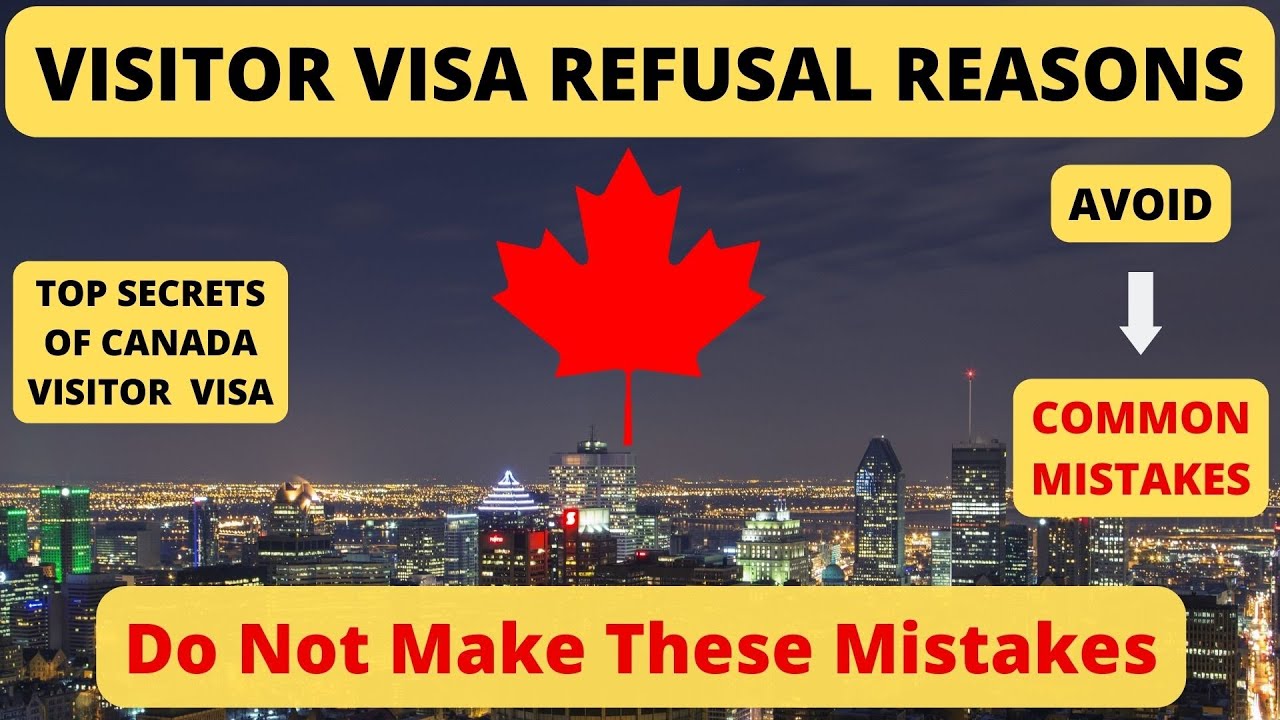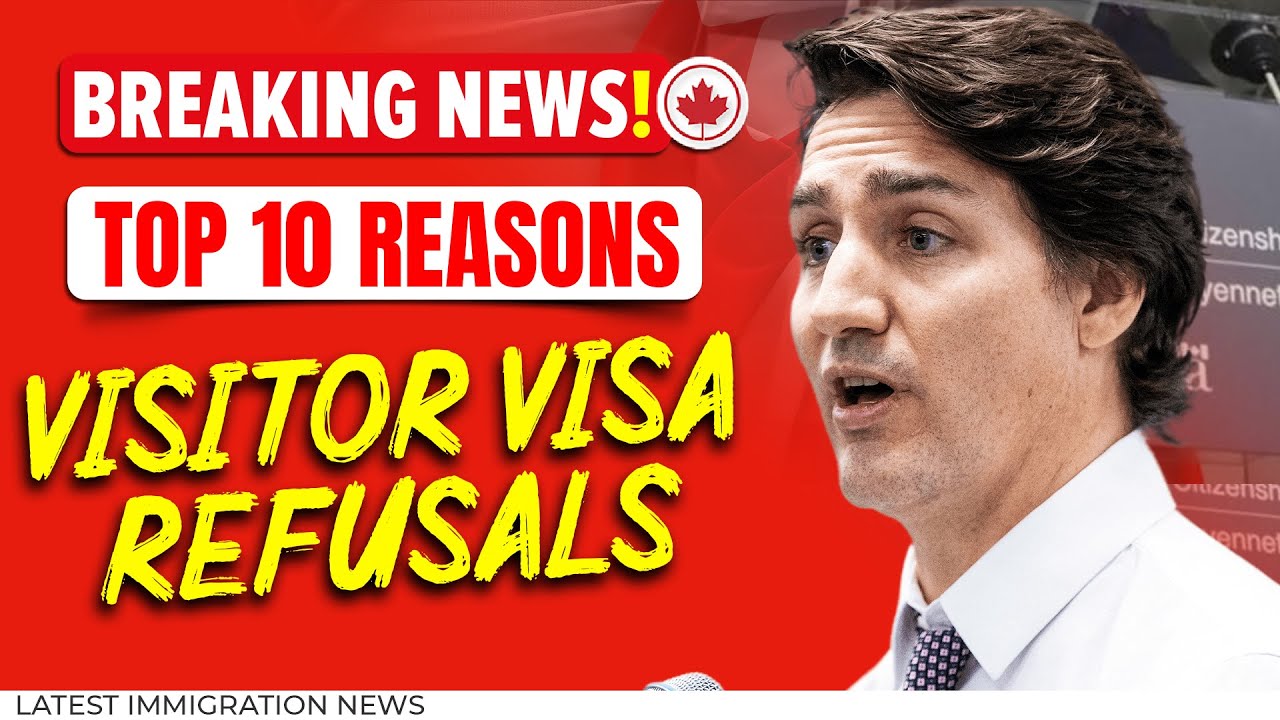Here are the top 10 Canada Visitor Visa Refusal Reasons: There are different reasons why an application for a visa may be rejected based on the unique requirements of each visa type.

1. Incomplete or Inaccurate Application Forms
One of the most prevalent causes of visa refusal is an incomplete or incorrect application form.
Missing information or supplying erroneous details can result in delays or outright refusal.
To avoid this, applicants should carefully read the application instructions and fill out all areas correctly and thoroughly.
2. Insufficient supporting documentation
A lack of suitable supporting documentation is another common reason for visa refusal.
Applicants must submit proof that they intend to return to their native country, such as job letters, property ownership records, or family links.
Furthermore, financial documentation proving the ability to cover trip expenditures is required.
Make sure you include documentary proof to support your application, depending on your situation:
- Travel history
- Letter of Invitation
- Proof of the relationship.
- Family information
- Itinerary
- Account Statement
Failure to present proper supporting documentation can cast suspicion on the applicant’s intentions and result in visa refusal.
3. Inadequate Financial Resources
Demonstrating sufficient financial resources to meet the trip’s costs is critical for visa clearance.
Applicants must present bank statements, income tax returns, or sponsorship letters demonstrating their ability to pay for their stay in Canada.
Failure to give compelling evidence of financial stability may cause immigration officials to question the applicant’s ability to sustain themselves during their visit, resulting in a visa refusal.
4. Lack of Travel History or Purpose
Immigration officers consider applicants’ travel history and purpose when determining their eligibility for a visiting visa.
A lack of past overseas travel or unclear intent to visit Canada can create concerns and result in a denial.
Applicants should clearly state their reasons for visiting Canada, whether for vacation, business, or to see family and friends, and offer supporting documentation to back up their assertions.
5. Incomplete or Unconvincing Travel Itinerary
A poorly designed or incomplete travel itinerary can also lead to visa denial. Applicants should include a detailed itinerary indicating their planned activities and lodgings while in Canada.
Confirmed travel tickets, hotel bookings, and scheduled tourist sites might help enhance the application and reflect a genuine desire to visit Canada for tourism.
Furthermore, a genuine invitation from a family member must be included in the application if you are applying for a visitor visa to meet your relative.
6. Failure to Demonstrate Strong Ties to Home Country
Immigration officials analyze applicants’ chances of returning following their stay in Canada based on factors such as job, property ownership, or family responsibilities.
A lack of evidence of ties to the home nation can generate suspicions about potential immigration plans, resulting in visa refusal.
Applicants should provide strong evidence of their ties to their home country to ensure immigration officials that they intend to return.
7. Misrepresentation or Fraudulent Documentation
Providing false information or fraudulent documentation is a serious offence that may result in visa refusal and/or a restriction on future entry to Canada.
Applicants must be truthful and transparent throughout the application procedure, as any anomalies or inconsistencies detected by immigration officials might result in serious consequences.
To prevent being denied entry into Canada, you must provide correct and reliable information.
8. Medical Inadmissibility
Applicants with medical conditions that endanger public health or safety may be declared medically inadmissible to Canada and denied a visitor visa.
Immigration agents review medical reports and may order additional medical exams to evaluate an applicant’s admissibility.
To maximize their chances of receiving a visa, applicants with medical issues must produce extensive medical documents and address any concerns highlighted by immigration officials.
9. Criminal Inadmissibility
People with a criminal record or previous criminal convictions may be judged criminally inadmissible in Canada and denied a visitor visa.
Before making a decision, immigration officers undertake background checks and consider the seriousness of the offence, rehabilitation efforts, and the risk to Canadian society.
Applicants with a criminal record should reveal their previous crimes and provide evidence of rehabilitation to alleviate worries and increase their chances of visa approval.
10. Overstaying or Violating Previous Visa Restrictions
Applicants who have previously broken visa restrictions, such as exceeding their allotted term of stay or working without valid authorization, may be denied future visa applications.
Immigration officers examine applicants’ travel history and adherence to visa terms to determine compliance with Canadian immigration regulations.
To avoid bad immigration outcomes, applicants must follow visa conditions and the terms of previous trips.
In conclusion, navigating the Canadian visitor visa procedure can be difficult, but with careful planning and attention to detail, applicants can increase their chances of success.
Visitors can boost their credibility and demonstrate their sincere purpose for visiting Canada by addressing the top ten causes of visa refusal listed above and providing extensive supporting documents.
Remember, honesty, integrity, and conformity with immigration regulations are essential for a successful visa application, along with paper proofs to support your application.
How much time can a person stay in Canada on a visitor visa?
Six months is the maximum time a person can stay in Canada on a visitor visa.
Can I extend my stay as a visitor in Canada after 6 months?
Yes, you can extend your stay as a visitor in Canada after 6 months. To extend your stay you must apply for visitor extension or officially known as visitor record.
Can I convert my Canadian visitor visa to a work permit?
Yes, you can convert your Canadian visitor visa to a work permit, but you will need to apply for a work permit that is supported by an LMIA (Labour Market Impact Assessment) or a job offer for LMIA-exempt occupations.
How much is the processing fees for Canadian visitor visa?
The processing fees for a Canadian visitor visa is CAD $100. Plus you may have to pay additional CAD $85 for biometrics if you are from a biometric-requiring country.
Best Canada Immigration Consultants in Chennai India
Being one of the finest Immigration consultants in India, we welcome you to consult us FREE! Our experts having experience of more than 10+ years. If you are an immigration aspirant looking to address your doubts and worries regarding Canada Immigration, Reach us simply through phone to our well-versed Immigration experts today!




